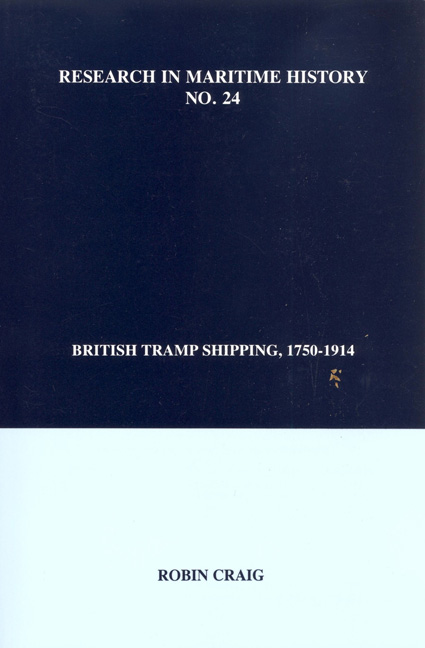Book contents
- Frontmatter
- Contents
- Introduction
- Tramp Shipping and Ownership
- The Trades
- The Seamen
- Tramp-Shipping Regions
- A. Wales
- B. The Northwest
- C. The West Country
- D. The Northeast
- E. The Southeast
- F. The British Empire: Maritime Canada
- “British Shipping and British North American Shipbuilding in the Early Nineteenth Century, with Special Reference to Prince Edward Island”
- Bibliography
“British Shipping and British North American Shipbuilding in the Early Nineteenth Century, with Special Reference to Prince Edward Island”
from F. The British Empire: Maritime Canada
- Frontmatter
- Contents
- Introduction
- Tramp Shipping and Ownership
- The Trades
- The Seamen
- Tramp-Shipping Regions
- A. Wales
- B. The Northwest
- C. The West Country
- D. The Northeast
- E. The Southeast
- F. The British Empire: Maritime Canada
- “British Shipping and British North American Shipbuilding in the Early Nineteenth Century, with Special Reference to Prince Edward Island”
- Bibliography
Summary
“It is a general complaint amongst merchants,” wrote Thomas Irving to William Pitt in 1788, “that they are losers upon capital vested in the shipping which they find necessary to employ, but I am inclined to think this loss in a great measure arises from an error in system, and that whenever the ship holder shall become a distinct body, unconnected with the importer or exporter, the grounds of complaint will be removed. Masters of vessels who have retired from the service or others who have made this branch their particular study are the most proper persons to become ship holders and indeed the trade has taken very much this turn of late.“
These shrewd remarks by one of the most informed observers of commercial affairs in his day illustrated the changing nature of shipowning in the late 18th century. The “error in system” which Irving detected probably relates to the somewhat primitive accounting system which prevailed in most counting houses of the time. No doubt it was true that the merchant who owned and operated his own vessels in his own trades tended to view the voyage accounts of individual vessels in isolation, and to ignore the very real advantages accruing to him both as a shipowner and as a merchant in being able to control with surer hands the disposal, purchase and deployment of his own consignments, both inward and outward. Half a century after Irving wrote his memorandum, merchant shipowners still lamented that shipowning was a losing business: the late Richard Pares in his history of the Pinney merchant house of Bristol tells us that this firm thought they lost by shipowning in the 1830s, but this again may have been because of the want of proper accounting methods.
By the end of the eighteenth century Irving's observation about the rise of the professional shipowner was however seen to be increasingly valid. An inspection of the registrations of vessels at London and the outports shows that the calling or occupation of shipowner and shipbroker becomes increasingly widespread as the century drew to its close. The gradual separation between the owners of shipping and the owners of freight was merely one aspect of the specialisation of function which was one of the main distinguishing features of industralisation.
- Type
- Chapter
- Information
- British Tramp Shipping, 1750–1914 , pp. 385 - 404Publisher: Liverpool University PressPrint publication year: 2003

